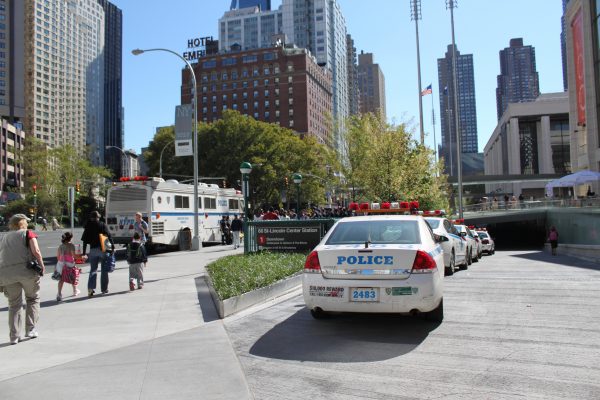Students Look to Fordham Public Safety After Chelsea Bombings
September 29, 2016
A major attraction of Fordham University are its New York City campuses in Manhattan and the Bronx. However, those locations can also be a cause for concern. Although crime in New York City has been decreasing heavily over the past few years, recent bombings in Chelsea and Seaside Park have some people worried about their safety in the city.
Robert Dineen, director of Public Safety at Fordham Lincoln Center attests that Fordham University takes security concerns seriously and works hard in order to maintain and ensure a safe environment on all of its campuses. “I believe it is important for the campus community to know that working in the Department of Public Safety at all Fordham campuses…are a very talented and hardworking team of public safety administrators,” Dineen said.
A crucial component of Fordham’s security is the school’s Emergency Management Plan (EMP). The EMP is a detailed set of procedures that covers almost all possible emergencies that could serve as a safety risk to students. These range from “Level 1” events like incidents of bias to “Level 5” events such as a major terrorist attack. The plan also includes guidelines for “Administrative Response,” which details the procedural response of many of Fordham University’s staff and faculty in the case of an emergency.
According to Dineen, the EMP is developed with input from all departments of the school, and is updated every year. “In our business we have to keep up with the changing times and the news that we are seeing from across the country and world,” Dineen said. “To date, we have invested heavily in personnel resources and state of the art technology that are key components of our emergency management plan.”
Being located in a large city presents some challenges to maintaining a safe environment, however it also provides valuable opportunities to take advantage of the city’s resources. Like other schools such as New York University and Columbia University, Fordham University has a close partnership with the New York Police Department (NYPD) and other New York emergency departments. “Each year, we conduct an emergency management exercise where we bring together our emergency management team, consisting of all the key representatives from the many departments and schools working here at the University,” Dineen said. “We also invite the NYPD to participate in the exercise, and depending upon the scenario, the city agencies that would respond to and have a role in a particular emergency.”
In those training exercises, Fordham University makes sure to cover as many possible scenarios as possible. “Over the past several years, we have scripted out emergency scenarios involving an active shooter situation, a sexual assault on campus, a hurricane bearing down on NYC and a large fight at a school sporting event,” Dineen said. “During the exercise, all those participating get the opportunity to explain their role and responsibility in mitigating the crisis.”
The EMP is also heavily influenced by the fact that thousands of students live on campus and that there can sometimes be reasons for evacuating students from their classes or dorms. This is a large decision to make so the school has to strike a delicate balance of making sure that they don’t evacuate students for a false alarm, while also making sure that it’s an easy and fast system so that the school can evacuate students efficiently. “That decision [to evacuate the school] can be made by a public safety administrator at any time depending on the situation we are responding to,” Dineen said. “In the case of a fire or smoke condition or other emergency condition, our public safety administrators are trained and authorized to evacuate our buildings here at campus, as appropriate to the situation. Of course, when the NYPD and FDNY respond to campus, we are also guided by their direction.”
Fordham University has also worked to incorporate new technology into its emergency response procedures. Over the past few years the school has adopted emergency text alerts which not only keep students updated about recent crimes, but also facilitate better communication between students and staff in an emergency situation. “We now have redundant channels of communication to get emergency messages to all members of our school community,” Dineen said. “We can send thousands of text, voicemail and email messages simultaneously to get important messages out on what’s happening, what we are doing and what you should be doing in an emergency.”
The threat of a dangerous emergency is always present in a large city, and Fordham University’s Emergency Management Plan was created with the intention of mitigating that threat as much as possible. While the plan is substantial, it is the hope of Fordham students and staff that it never has to be used.












